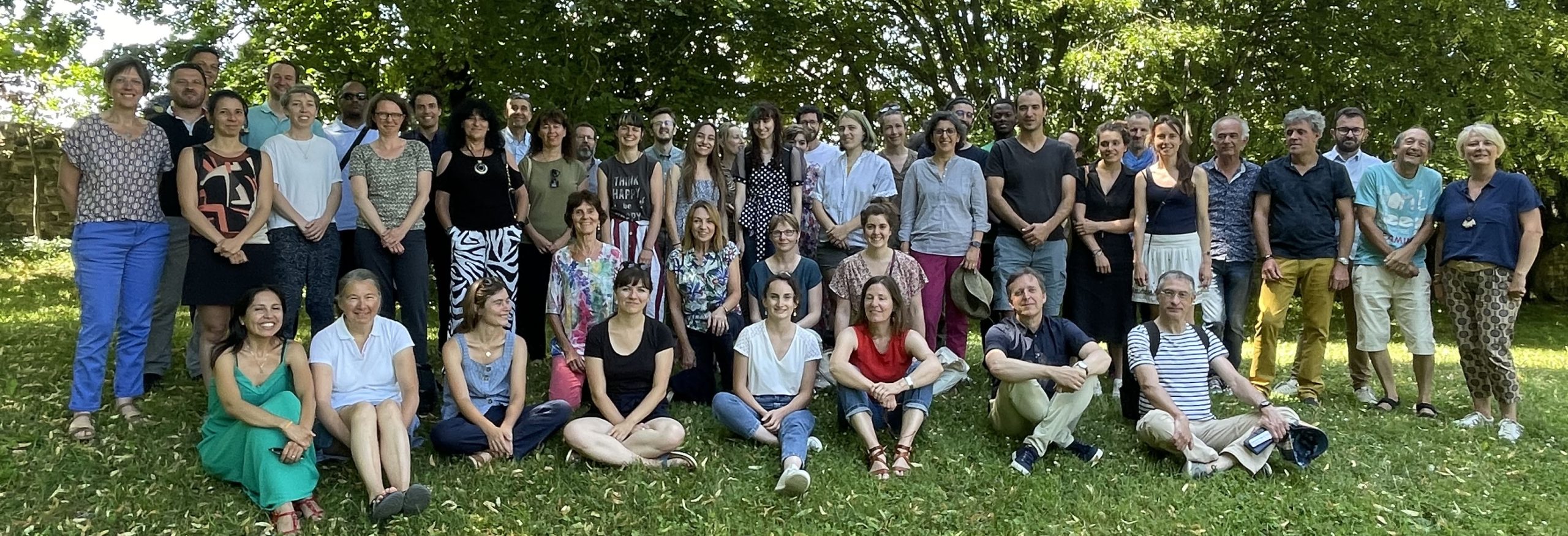
UMR Territoires is a Research Insitute, focusing on the observation, analysis and support of spatial development dynamics, and based on long-term interdisciplinary practices and partnerships. Bringing together staff from AgroParisTech, INRAE, Université Clermont Auvergne and VetAgro Sup, the research unit’s identity is based on a systemic approach to territorial transitions.
By combining social sciences (mainly geography and economics) with biotechnical sciences (agronomy and zootechnics), using a variety of methodologies (quantitative and qualitative), pioneering the use of ‘serious games’ and participatory practices, and being at the heart of the Clermont-Ferrand scientific excellence (I-Site CIR CAP 20-25), UMR Territoires contributes to the creation of a collective understanding of the challenges of transition at all scales.
The Research unit’s members work together on a common scientific project, divided into four thematic groups, with cross-disciplinary activities.
🔶 Agriculture and societies in transition (ASSET)
The shared objective of this thematic group is to analyse and support changes in agriculture towards more resilient, liveable, viable and resource-efficient forms. More specifically, the aim is to identify, understand and co-construct new forms of agriculture in terms of practices, work, farms management and links with socio-economic and local actors. Several objects of research are at the heart of the group ASSET : combinations of agricultural activities; the work of farmers and workers; new forms of farms and farming collectives; and support for farmers and their collectives when transitioning.
🔶 Territorial dynamics and transitions (DynaTTer)
This thematic group provides a forum for research on spatial dynamics and transitions, using a cross-disciplinary approach to address ecological, social, economic and democratic issues and the way in which these issues interact. The work carried out by the group focuses on four main areas: 1) territorial development processes; 2) fragilities, vulnerabilities and socio-spatial inequalities; 3) stakeholders and transitions; 4) public policies and territories.
🔶 Socio-ecological and food systems in territories in transition (SESA)
The aim of this thematic group is to carry out research on socio-ecological systems (SES), taking into account the complexity of human-nature interactions in both time and space, in the light of the challenges of the ecological and food transition in the regions. The diversity of the SES studied by the group will make it possible to link the issues of food, water, land and the management of natural areas, by focusing on the dynamics of interaction between the actors in the system and between the systems of actors and their ecosystems.
🔶 Territories of the Anthropocene
This new thematic group aims to explore ways of ‘making territory’ in the shadow of ecological discontinuities caused by human activities, by bringing together new theoretical resources for this purpose. It is thus interested in the processes of rupture and disorder that occur in territories and the new territorialities that they are likely to engender. He will be able to investigate and experiment ‘on the edge’ between the failure of well-established ways of ‘making territory’, the whistleblowering and collective phenomena of redirection.
🔶 GAMAE, a scientific and technical platform for serious games
![]() Housed within the UMR Territoires on the Campus and supported by the INRAE-ACT department, the GAMAE platform is a nationwide centre offering a range of services and expertise to those wishing to design, use or evaluate serious games. The platform combines scientific and technical expertise, an online search engine for available serious games and a range of resources offered by the team to support, test, evaluate, promote, teach and train people in the use of games
Housed within the UMR Territoires on the Campus and supported by the INRAE-ACT department, the GAMAE platform is a nationwide centre offering a range of services and expertise to those wishing to design, use or evaluate serious games. The platform combines scientific and technical expertise, an online search engine for available serious games and a range of resources offered by the team to support, test, evaluate, promote, teach and train people in the use of games
🔶 EIDER Workshop – Economics, Institutions, DEvelopment and Rural areas
The monthly research seminar in economics explores a wide range of topics related to regional economies and rural areas. It may feature theoretical, methodological, or thematic presentations, with particular emphasis on the work of doctoral students, as well as that of national and international researchers.





